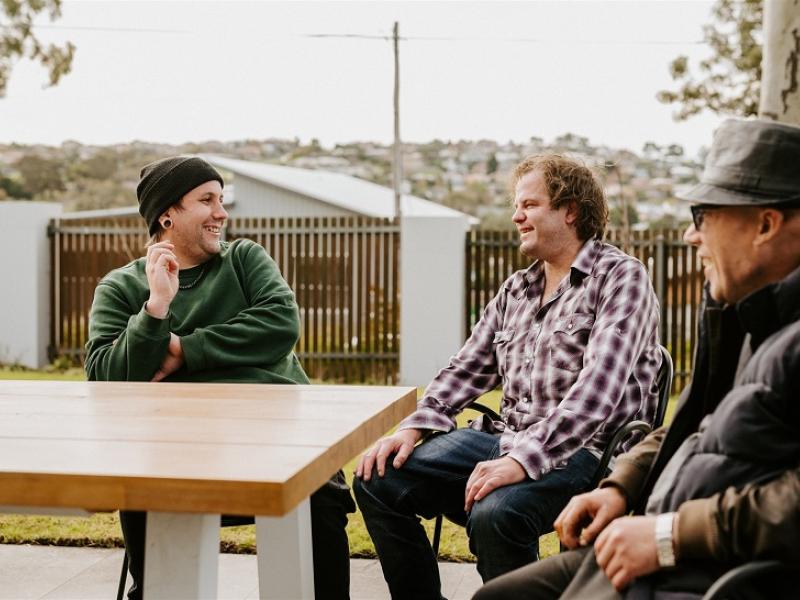Mind Australia CEO Gill Callister has labelled the increased role of people with lived experience of mental ill-health as the “game changer” in mental health reform.
Ms Callister said Mind’s Lived Experience Strategy launched in December, highlights the important role people with lived experience will play in providing a much-needed culture shift across the sector.
“Changing culture is probably the hardest part of any single transformative change,” she said.
“To actually bring these changes to life and not just have them sit alongside a dominant culture requires us to actually shake things up, think about how we work. It’s going to take more than lip service.
“Mind is engaging different voices and experiences to deliver across multiple platforms and services, setting new targets and new ways of thinking and working.”
Lived experience is a person’s experience of mental ill-health and the journey of recovery.
It recognises the unique insights, awareness and opportunities lived experience provides and differentiates between the lived experiences all people have, and those uniquely informed by life altering mental health challenges.
Katie Larsen, Mind’s Senior Manager Strategic Reform, brings a lived experience of mental ill-health to Mind, including leading Mind’s Lived Experience Strategy development.
Katie sees this as an opportunity to reframe lived experience as strength, knowledge and insight – and describes it as a “real privilege”.
“Mind has a long story of delivering lived experience approaches but we saw an opportunity to do more, to really centre our organisation strategy around lived experience and commit to drive and shift change.”
Lived experience and the Royal Commission
Ms Callister and Katie were joined by Katherine Whetton (Deputy Secretary, Mental health and wellbeing, Department of Health Victoria), Marie Piu (CEO, Tandem Carers) and Craig Wallace (CEO, VMIAC) at the launch of the strategy. They spoke about the role of lived experience in the 74 recommendation of this year’s Royal Commission into Victoria’s Mental Health system.
Ms Whetton said the Victorian Government had a strong focus on recognising those with lived experience as a strategic partners – “not just stakeholders”.
“It’s really clear that Mind’s Lived Experience Strategy is also aiming much higher than just talking about lived experience. It’s really about a partnership and I do think that reflects a lot of what we heard from the Royal Commission and it’s certainly what we’re seeking to do in our work at the Department.
“Lived experience is a key part of building our internal lived experience capability and supporting the broader sector as we identify the issues and challenges that do exist from a lived experience perspective.
“We are bringing lived experience to everything we do and making it everyone’s responsibility.”
Ms Whetton said organisations like Mind play a critical role to the success of mental health reforms.
“We know how well recognised and valued Mind is in the community with longstanding service delivery in mental health.”
Ms Piu said the Royal Commission has clarified the authorising environment while putting lived experience in the spotlight.
“The Commission makes a number of recommendations to elevate experiences and expectations of consumers, carers and family supports so that they are at the centre of the services and reform process.
“Our members feel as though our campaign landed and the Commissioners heard, and the final report says it all - so it’s very exciting.”
Mr Wallace said people with lived experience now needed to be provided the opportunity to drive reforms.
“They need to be involved in all aspects from the very beginning through to evaluation.
“Being responsive is the very best thing you can do for consumers with lived experience… it sends a message that what you said matters, we’ve taken it on bard and it will be integrated.”
The importance of lived experience
The development of Mind’s Lived Experience Strategy involved collaboration with Mind’s lived experience staff, Lived Experience Advisory team as well as a number of lived experience leaders in the sector.
Three experts with lived experience helped launch the strategy: Dr Louise Byrne (Senior Research Fellow, RMIT University), Simon Katterl (Consumer Workforce Consultant) and Lisa Sweeney (Mental Health Advocate).
Mr Katterl said “cultures of practice” was one of the big barriers for embedding lived experience effectively and genuine collaboration was vital.
“When we talk to consumer and carer communities there is a real focus on co-production and co-design because they explicitly talk about power and decision making and treating people with lived experience as decision makers.
“We’ve got a fair way to go in terms of shaping the debate and policy agenda so it is more aligned to human rights. But I still think there is a lot of hope in current reform agenda for change.”
Ms Sweeney said cultural change would be impacted by attitudes.
“Something that is really important for our workforce is to operate from a central place of asking whether the care or support they are providing and the system they are working in is what they would expect for themselves or the people they care about.
If we could somehow get people to operate from that starting place then cultural change would follow.”
Dr Byrne said “cooperation, collaboration, respect and acceptance were also paramount for change to occur.
“How do we do that practically? We need lived experience leaders at all levels and all settings in organisations and the sector more broadly.
“And you need whole of sector education, people coming into the workforce understanding what lived experience does and is. This is about a paradigm shift. We need to completely reconfigure the way we view what is valuable knowledge.
“Put your money where your mouth is as Mind is doing.”
Ms Callister said the launch of the strategy was an “important day for the organisation and lived experience leaders across the system.”
“It’s a piece of work that has been in the making for a long time and it sets the scene for the future.”
Read more on Mind’s Lived Experience Strategy.
